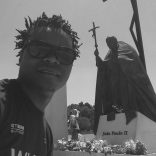Mozambican band 'Kapa Dêch' on stage at almost 30
Mozambique-born Mariza opens up about her early struggles and overnight success

Courtesy Abu Dhabi Festival / Singer Mariza
Mariza is adamant she never wanted to be famous. Since the release of her debut album 15 years ago, the singer has inarguably been Portugal’s greatest musical export, enlivening the country’s traditional fado music for a global audience.
Yet that first album, titled Fado em Mim – literally Fado and Me – was never intended for release. Recorded as a present for her father, Mariza says it took six months of pestering by the World Connection label from the Netherlands until she finally signed.
“I said to the [label’s] president: ‘No way Jose, because you are Dutch, I am Portuguese, and you don’t understand anything about it’,” recalls the singer, speaking ahead of her UAE debut tomorrow at the Abu Dhabi Festival.
“He started really being annoying – calling, sending e-mails – and then one day six months later, I was so tired. I said: ‘Just tell me something, you’re going to bring me a lot of problems’. He said: ‘No, no, no, it is world music, it is a completely different thing – you’ll just be safe and secure and I’m not going to do anything to put you into a stress-world’.”
In April 2002, Fado et Mim was released in 35 countries, selling more than 120,000 copies in one month in Portugal alone – at a time when “selling 3,000 fado records was very, very good”. The safe and secure private life Mariza had enjoyed for close to a decade, singing in clubs since her teens, was shattered.
Fado em Mim remains a fine gift to her father. Born Marisa dos Reis Nunes in 1973 to mixed parents in Portuguese Mozambique, Mariza’s family fled when she was 2 years old, following the overthrow of the ruling colonial powers. Outcast upon their arrival in Lisbon, opening a taverna and hosting regular traditional fado nights was her Portuguese father’s way to integrate his family into Mouraria’s working-class neighbourhood. It was here, at her father’s behest, that Mariza became schooled in fado – a 200-year-old musical tradition characterised by a sense of longing, often described as “Portugal’s blues” – and first appeared on stage at the age of 5.
“We arrived here in Lisbon with nothing – no money, no house, no documents, no nothing,” remembers Mariza.
“I was an outsider, me and my family. In the middle of the 1970s, arriving in Portugal as a mixed couple – everyone was looking like ‘this is so curious, not normal’.”
Mariza’s sudden phenomenal success has been explained as the Portuguese public’s response to the death of fado’s most-famous practitioner, Amália Rodrigues, whose material Mariza reinterpreted on Fado et Mim.
However, when the time came to record 2003’s follow-up, Fado Curvo, the comparisons were taking their toll.
“I was really, really mad when I did the second [album],” she remembers. “I was upset because everyone was comparing me with the biggest icon ever of fado.
“I said to my label: ‘I’m not going to make a second album, I want to stop’. And they said: ‘But you have a contract’. They got me – I had to. It is a very deep, dark album – it is deep, mad and sad at the same time.”
The album was also a success and the demand for Mariza was huge – selling concerts tickets across the globe, which she describes as both creating and filling her with an existential loneliness.
“People start looking at you as money,” she remembers. “I started doing 140 concerts a year – I realised I was not a person any more, but a machine for making money.












Leave a Reply
Be the First to Comment!
You must be logged in to post a comment.
You must be logged in to post a comment.